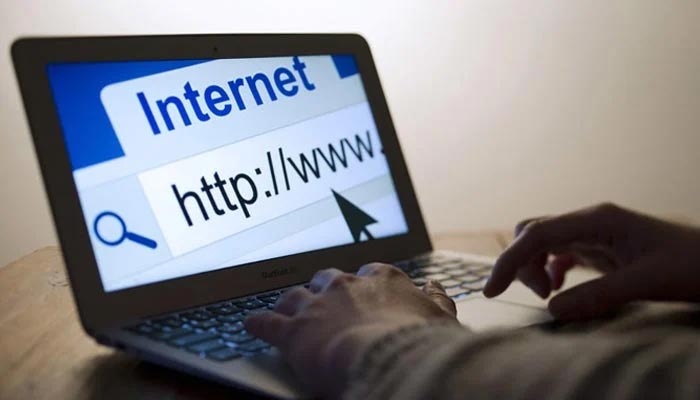A race to the bottom
Through an executive order, govt pushed millions of mobile broadband subscribers into dark ages, effectively enacting a digital iron curtain
May 14, 2023

Whenever one feels that it cannot get any worse, it does get worse. It's a race to the bottom, and we clearly aren't stopping anytime soon. The government unilaterally, and without any concern for potential loss of billions and income erosion for millions, decided to shut down mobile broadband across the country amidst political volatility. An executive decision that cut off mobile broadband, or internet access to millions in the country.
There are 128 million internet connections in the country as per the Pakistan Telecommunication Authority — of which 125 million are mobile broadband users, while only a small number use fixed line internet.
Through an executive order, the government pushed all those xx million mobile broadband subscribers into the dark ages, effectively enacting a digital iron curtain.
The underlying objective of enacting such a digital iron curtain may be to avoid independent coverage of the ensuring political volatility, but the unintended consequence and ripple effect of the same meant losses of billions across the board.
It is estimated that more than 200,000 individuals are associated with the gig economy, relying on ride-hailing, and delivery services to make ends meet in a potentially hyperinflationary environment. The government — with little regard for their income — which directly affects the food they put on the table for their households, cut off access to income through an executive order.
These are individuals who do not have access to any formal employment, or social nets, and every day that they are not able to work, they lose income, and ability to provide for their households.
Anecdotal evidence suggests that such individuals can earn anything between Rs800 and Rs1500 on a daily basis — this suggests a loss of roughly Rs1 billion in direct income losses as mobile broadband was shut down for almost three days.
The government continues to make decisions that are anti-people and anti-economy. These decisions only erode the confidence of the people in the economy, and the intent of policymakers at large.
It is estimated that more than 500,000 freelancers are operating in the digital economy, generating precious foreign exchange reserves for the country, while taking very little, or nothing from the government in return. The government, which opens its coffers for rent-seekers all the time, does not have to provide any support to these freelancers. They operate in a global competitive market for labour, and succeed.
Meanwhile, the government and its functionaries, most of which can barely operate in a competitive market, unilaterally cut-off access to mobile broadband for them all, effectively restricting their ability to make a living.
Concrete numbers are hard to come by, but anecdotal evidence suggests that an average freelancer would be able to earn Rs150,000 per month (approximately $530 per month), implying daily income of Rs5,000. This suggests a potential loss of Rs7.5 billion for a three-day period. Once again, the government completely eroded incomes that were formal, taxed, and provided previous foreign exchange reserves.
There are more than 6,000 e-commerce stores, and many more restaurants operating in the country, mostly micro, small and medium enterprises, that generate significant employment, and catalyse economic activity.
Through enactment of a digital iron curtain, the government effectively pushed down the productivity and economic activity of all such e-commerce stores, and their vendors, thousands of which would be micro, small, and medium enterprises.
It is estimated that more than a million people would be employed directly, and indirectly by the logistics segment, and value chain serving the restaurant industry, and e-commerce stores. The government effectively eroded income for them all, just because of one person shuttling between M2.
This led to a drop in aggregate demand, as can be seen in the drop of digital payments, which fell by more than 50% relative to a rolling average. As aggregate demand dropped, so did economic activity, and incomes for people. In an environment where the informal economy is potentially bigger than the formal economy, the government is not keeping any stone unturned to make the informal economy bigger.
A direct consequence of all these decisions is on telecommunication operators, which suffered heavy losses during the three days the digital iron curtain was enacted. As this has become a recurring feature, it has led to policy inconsistency issues, resulting in telecommunication operators avoiding investing in telecommunication infrastructure in the country.
This also means lower tax revenue for the government. Telecommunication taxes in the country are already amongst the highest in the emerging and frontier markets. Policy inconsistency makes it even more difficult to operate, as a consequence of which a foreign telecommunication operator is desperately trying to leave.
The government and it's functionaries may need to decide whether they exist to work for the people or against the people. Any unilateral executive decision that hurts the economic interests and welfare of a large segment of population cannot be a sound decision under any decision-making framework.
Failure to keep inflation under check or to balance budgets and deficits has already led to a situation where a citizen is worse off compared to the last few years, and there is no end in sight for the downward spiral.
The least a government can do is respect the economic agency of its citizens, and not impose draconian measures that lead to unnecessary chaos and loss of economic value. There is a youth bulge, and that bulge is unemployed, sparingly educated, and frustrated due to the incessant political volatility. At the end, it's a binary decision: does the government exist for the people or against the people?
The writer is an independent macroeconomist.
Disclaimer: The viewpoints expressed in this piece are the writer's own and don't necessarily reflect Geo.tv's editorial policy.
Originally published in The News











